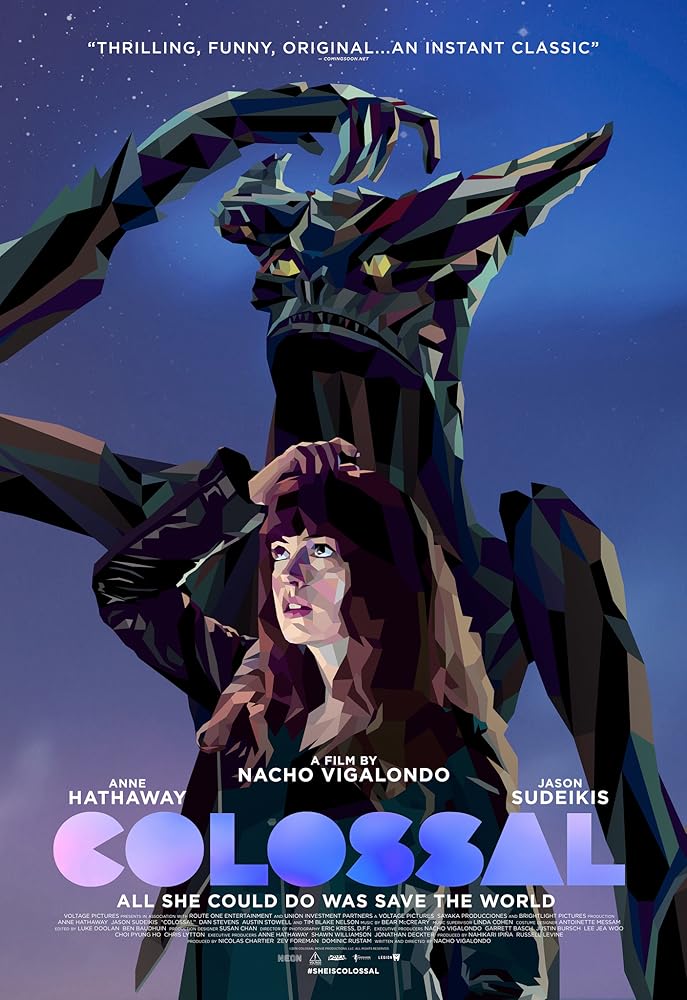
Colossal
is one of those movies that advertises itself as one thing but reveals itself
to be something else entirely. While the trailers try to sell it like someone
was trying to write a romantic comedy after watching Pacific Rim, the reality couldn’t be further from the truth. One
trend I’ve been seeing in indie films lately that I really dig is taking
bizarre, out-there premises that are initially played for comedy but slowly
reveal themselves to be about something deeper, like how a movie about a talking, farting corpse is actually about personal isolation and the legacy of
emotional abuse, or how a movie about a man who will turn into a lobster if he can’t get a girlfriend becomes an examination of the absurdities of modern
relationships. In Colossal’s case,
the idea of controlling a monster on the other side of the world turns into a
metaphor for how self-destructive behavior affects the world around us.
Our story follows Gloria
(Anne Hathaway), an unemployed, alcoholic writer who has burned more than a few
bridges. After her boyfriend (Dan Stevens) breaks up with her and she’s kicked
out of their New York apartment, she moves back to her childhood home and
reacquaints with an old friend, Oscar (Jason Sudeikis), who sets her up with a
job at his bar. On the other side of the world in South Korea, a giant monster
has been appearing out of nowhere and terrorizing Seoul before mysteriously
disappearing. Gloria figures out that she’s been controlling the monster, which
only materializes and mimics her every move whenever she stands inside of a
playground near her house. This becomes especially problematic when Oscar, who
turns out to have some serious anger and control issues, discovers he has the
same ability (except his avatar is a giant robot) and leverages this power to
control Gloria.
The genius of Colossal is two-fold. As previously
mentioned, taking two genres as disparate as the romantic comedy and kaiju
films is a novel concept, but director Nacho Vigalondo uses the basic tropes of
one to subvert the other. Any fan of kaiju series like Godzilla, Gamera and the like will tell you that while watching
giant monsters rampage through the streets is the big drawing point, they’re
just as much about the human character arcs and how they intertwine with the walking
disasters outside. As for the romantic comedy aspects, they’re virtually
nonexistent. I only really bring them up because that’s what the trailer wants
you to believe, but I’m here to tell you that the relationship is as far from
romantic as you can get. Both of our leads have the same demon (alcoholism),
but they cope in different ways, neither of which make them entirely
sympathetic, and both of which cause major damage to themselves, their loved
ones, and millions of strangers on the other side of the world. For any viewers
who’ve dealt with alcoholics at any point in their life, these characters might
be uncomfortably recognizable.
Of course, this is truly
an actor’s film. Anne Hathaway, playing against type, is easily the more relatable
character, but she’s not exactly likable. She’s spoiled, selfish,
irresponsible, and nearly all of the bad things that happened in her life were
mostly her doing. The first time the monster appears in Seoul is when he
drunkenly staggers through the playground at night on her way home from the
bar. But there are people who haven’t given up on her, as made evident by the
fact that her ex-boyfriend checks up on her regularly to make sure she’s
alright. Jason Sudeikis, on the other hand, keeps his drinking problem low key,
with his nice-guy persona slowly chipping away to reveal the bitter, entitled,
controlling part of him that’s been ruminating on the inside. Both are clearly
having a blast with these roles, relishing and channeling their
most fatal flaws for maximum effect.
Those looking a good
kaiju fight might leave a little disappointed, because while it is the crux of
the plot, it’s not the main focus, only being brought into play during major
plot points. About 70% of the movie is spent hanging out with Gloria, Oscar and
their friends at the bar, but it becomes a major point of leverage when Oscar’s
true nature gets more out of control, culminating in a big blowout between the
two that nearly results in the annihilation of Seoul, and is resolved in an
amazingly clever way that I dare not spoil here, but was enough to make me shoe
off the nagging question of why Gloria doesn’t just stay away from that
playground.
Overall, Colossal is a one-of-a-kind movie that
may not be for everyone, but has a lot to offer for everyone who does choose to
see it. The performances are outstanding, the premise is both clever and
brilliantly executed, it has a lot to say about toxic behavior and
relationships, there’s a great balance between the humor and drama, and even
though those looking for some kaiju action may leave a tad disappointed, there’s
still something there to tide them over. Don't be surprised if this ends up becoming a cult classic a few years down the line.
8/10
No comments:
Post a Comment